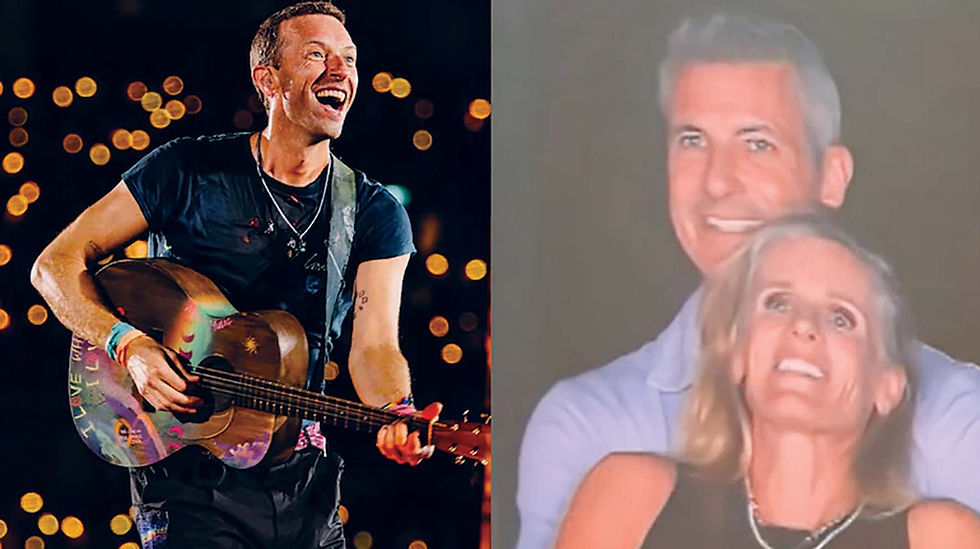Social Media: An Unsolicited Top Court
- Ruddhi Phadke

- Jul 24, 2025
- 4 min read
The Coldplay concert scandal underscores the price of going viral.

There are many ways to be caught out - a polygraph test, a gruelling interrogation, a stray moment captured on CCTV or something as innocuous as attending a concert for a bit of joy. If you frequent social media, you may already know the story of two individuals who took an evening off from their routine pressures to enjoy a musical performance only to find in a matter of seconds their personal lives, careers and reputations nearly crushed.
Coldplay, the British rock band formed in London in 1997, certainly made headlines last week. Even those previously unfamiliar with the group have now heard of them. Regrettably, this newfound attention was not because of a stellar performance but because the band, unwittingly or otherwise, embarrassed two of their fans on social media.
The band were performing in Boston in the US last week. Needless to say, they set up a giant screen which is a common feature of any concert. During the concert, their cameras turned to all of their fans, but two of them were thoroughly embarrassed and did not seem to like it. The man ducked from the frame and the woman turned away. Cold Play singer Chris Martin hit the nail on the head when he said, “they were either having an affair or simply shy.”
Investigations that followed proved it to be an affair. To make matters worse the two were high-profile individuals. The person caught on camera was a CEO of a major tech company with his HR head. The internet just exploded. They were not just targeted, but they were attacked by memes, reels, forwards, jokes and posts and criticism which to them seemed even worse than drones and missiles.
Not just the couple - Astronomer CEO Andy Byron and HR Chief Kristin Cabot, had their social media profiles flooded with messages but their family members too had to face the fire. The couple's reaction, with Cabot covering her face and Byron ducking down, was widely shared and sparked public scrutiny. Byron subsequently resigned from his position, with his company stating that their leaders are expected to set the standard in conduct and accountability. Experts believe that the incident may have a cascading effect on the reputation of the company.
The unfolding of the events further has sparked discussions about online consent, public shaming, and the boundaries between private lives and public entertainment. While mostly the sentiment is highly against the couple who were found cheating their respective spouses, the question remains, is it justified to be filmed and showcased in this manner in public, and did they deserve to lose their jobs due to this one incident?
Anurag Tagat, an assistant editor at Rolling Stone India, points out that most concert organisers clearly state that by purchasing a ticket, attendees consent to being filmed and photographed for promotional use. “As long as people are aware of that, it should be fine,” he says. “If not, they just need to read the fine print.”
What happened may seem unfair, but the internet is an unforgivingly public space. For those caught in the glare of unwanted attention, there are few remedies: lock your profile, delete it perhaps, and wait for the storm to pass. Privacy, once surrendered to social media, is difficult to reclaim.
The creator economy thrives on viral moments, and users are quick to monetise them. Gracie Springer, the fan who filmed the now-infamous clip, is not yet a household name but experts are already advising her on how to become one.
A closer viewing of the video suggests that it was not the act itself but the reaction - furtive glances and efforts to obscure faces - that fuelled the narrative. It is possible the couple weren’t romantically involved at all. But the moment they appeared on the big screen and tried to hide, the world delivered its verdict without evidence, but with conviction.
Media reports highlight that when the two appeared on the big screens, another woman was seen smiling in shock. According to an X user, the woman is Alyssa Stoddard, who is also an employee of Astronomer. The post alleged that she was recently promoted by Cabot. Social media users concluded that Alyssa was privy to the alleged affair.
What’s also important to note here is, the internet has passed its judgement and the couple is facing the consequences, but I cannot imagine the impact of the episode on the minds of Byron’s children who are in their teens. Did they deserve to see the viral video of their father and pass through the internet storm that followed? Such incidents often push teenagers into situations involving tricky psychological repercussions.
In the age of the Internet and AI nothing remains private. Even smartphones are spying on you when you are keeping them safe in your pockets. You cannot avoid socialising, either physically or virtually. However, you can always define the boundaries. Framing norms for social media is a real concern today as it has invaded both privacy and personal liberty. It is important to be responsible while reacting to matters not connected to us. It is important to avoid moral policing in cases that do not concern us, to avoid irreparable devastation for the victims who we possibly have never met.





Comments